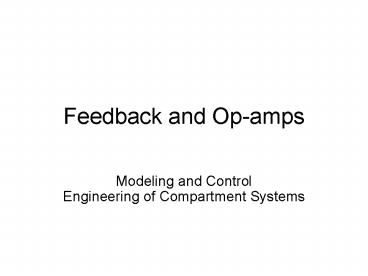Feedback and Opamps - PowerPoint PPT Presentation
1 / 21
Title:
Feedback and Opamps
Description:
how systems remember the past, and which results from the time integration and ... The Battleship Texas. Commissioned 1914. How do you move the rudder of the Texas? ... – PowerPoint PPT presentation
Number of Views:38
Avg rating:3.0/5.0
Title: Feedback and Opamps
1
Feedback and Op-amps
- Modeling and ControlEngineering of Compartment
Systems
2
What This Course is All AboutFour Central Ideas
of Engineering
- The Dual Variables of Effort and Flow
- how power flows between interacting objects,
regardless of their domain (e.g. Electrical,
Mechanical, Thermal, Biological, etc). - State
- how systems remember the past, and which results
from the time integration and storage of energy. - Transduction
- the bidirectional transformation of effort and
flow from one domain to another. - Feedback
- used in almost all engineered devices to bring
about desired behavior despite undesired
disturbances.
3
The Battleship TexasCommissioned 1914
4
How do you move the rudder of the Texas?
?
5
Answer FEEDBACK
6
The OPA551 Op-Amp
7
A Zero-Order Model of Op-Amps
Left eye Negative input Right eye Positive
input Actuates triceps if left eye gt right
eye Actuates biceps if right eye gt left
eye Rate of arm motion proportional
to difference the eyes see Proportionality
constant is very high Eyes dont disturb what
they look at Due to buff build, arms cant
extend or contract all the way
- input
input
input
- input
8
Our first Model of an Op-Amp
9
Characterize our Integrator
Measure response as we change w
10
Linear Systems
- Input/Output
- Result
- For linear systems, a sinusoidal input resluts in
a sinusoidal output of the same frequency. - We can characterize the system with two
parameters - Magnitude
- Phase
11
The Bode Plot
Developed 1930s Published 1945
12
For Pure IntegratorsIf sine goes in, what Comes
Out?
Input frequency goes up by 10x, output amplitude
goes down by 10x Output phase is always 90
degrees delayed from input.
13
Bode Plot of an Integrator
-90 degrees phase -20dB/decade 0dB at 1 rad/sec
14
Bode Plot of OPA551Open Loop Response
Looks Like an Integrator From about 10 Hz to 100
KHz
0dB is at 2 MHz ! Gain at 10Hz is over 100 dB!
100dB 20 log10(Vgain) 5 log10(Vgain)
Vgain 105 100,000 WOW!
15
Whats a dB? Acoustically
Phenomena Our ears are sensitive to the log of
acoustic power. 10 times power 10 dB 100 times
power 20 dB 1000 times power 30 dB
16
Rock Roll (120 dB) power compared to Rustling
Leaves (20 dB) power
120dB 20dB 100dB
100dB 1010 power ratio RR 10 Billion Times
more power than rustling leaves
17
dB for Voltage and Current is a little different
dB for Power
dB for Voltage or Current
18
Output Saturation
19
Our second Model of an Op-Amp
20
Finite Slew Rate
21
Our final Model of an Op-Amp































